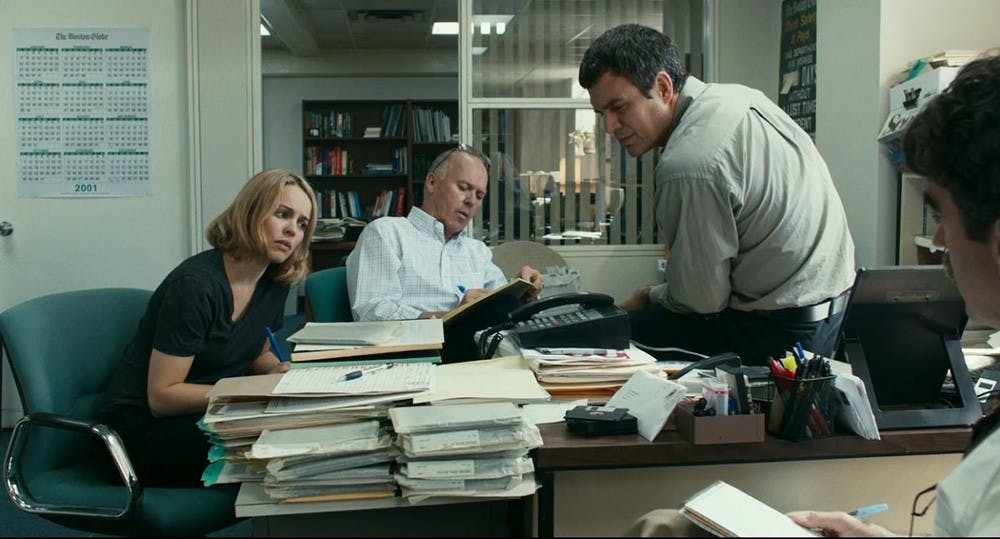The 88th Academy Awards were held Sunday, and the show was sharper than it's been in years, while also bringing quite a few surprises. This Oscar season’s outcome was the least clear in recent memory, and as a result, we can only claim a 66 percent success rate in our predictions.
Our missed categories range from major awards like Best Picture and Best Supporting Actor to all three Shorts categories. Naturally, we also missed the out-of-nowhere Visual Effects win for “Ex Machina,” which beat out big-budget heavyweights like “Star Wars: The Force Awakens” and “The Martian.”
Surprisingly, early season front-runner “Spotlight” won Best Picture. While the journalism drama cleaned up with critics organizations, its only major industry win was the Screen Actors Guild Best Ensemble Prize — an award with traditionally the worst predicative power of all the industry awards. While an incredibly deserving winner — the 12th best-reviewed Best Picture winner ever, according to Rotten Tomatoes — this victory made “Spotlight” the first movie to win Best Picture with only one other Oscar since 1953. It also won Best Original Screenplay, the first award of the night.
“Mad Max: Fury Road” won the most awards with an early technical sweep of six awards. “The Revenant” won three, including the long-awaited Best Actor win for Leonardo DiCaprio. The latter made history in other ways — cinematographer Emmanuel Lubezki won his third consecutive Oscar, while director Alejandro G. Iñárritu became the first in 66 years, and only the third ever, to win back-to-back Best Director awards. Iñárritu claimed another victory over playoff music — his acceptance speech, a powerful statement about industry diversity, overpowered the poorly-timed, premature music urging him off the stage. In a ceremony where diversity was a main issue, the Best Director category remained a surprising source of diversity — a white director has not won in four years.
Whenever a handful of movies dominate, many deserving contenders go home empty-handed. The bunch this year included “Star Wars: The Force Awakens,” “The Martian,” “Brooklyn,” “Creed,” “Straight Outta Compton” and “Steve Jobs.”
Host Chris Rock proved to be one of the best hosts in years, showing a comedian may be the best option for hosting an often unwieldy, unenergized show. Rock hit diversity-related criticisms dead-on with sharp jokes.
It wasn't a perfect show, however. Rock’s opening monologue had some great moments but sacrificed depth for breadth, while a mid-show Girl Scout cookie bit felt like filler and was too close to Ellen Degeneres's pizza bit from a few years ago. Likewise, some critics have challenged the show's treatment of the industry's diversity woes as a strictly black and white problem, which excluded the problems faced by groups, such as women, Asians and Hispanics, in the industry.
Some of the show's best moments were in Rock's pre-recorded bits. One particularly biting and hilarious scene inserted black actors into nominated movies. Leslie Jones, substituted for the bear in the now-famous attack scene in “The Revenant,” was a highlight. Similarly, Rock's bit of interviewing moviegoers in Compton lampooned both the Oscars' lack of diversity and the lack of public viewing of the major nominees. A Black History Month Minute segment was another priceless bait and switch.
Many presenters and award recipients also brought their A-game. Louis C.K.’s presentation of the Best Documentary Short award was hilarious while also touching. In addition to Iñárritu’s speech, top speeches of the night include DiCaprio’s stance against climate change, Brie Larson’s crisp and professional Best Actress speech, Mark Rylance’s eloquent receipt of a surprise Best Supporting Actor upset and Pete Docter’s call for creativity upon receiving Best Animated Feature for “Inside Out.” The winners for “Mad Max: Fury Road” were an entertaining and eclectic bunch, especially the recipients of Best Sound Editing, who spoke of sound’s importance in story telling throughout history.
This year, the show producers tried to encourage more meaningful speeches by having winners provide a list of thank you’s to be shown on the bottom of the screen after their name was announced, but this had minimal impact — most speeches were still lists of names to thank, too much a part of the idea of an Oscar speech to expect a change in behavior after just one year, if ever.
While the broadcast itself had no way to overcome the underlying problems of the Oscars and the broader movie industry, it succeeded in skewering those very problems. Especially in contrast to last year’s show — which felt like it was trying to be the Grammys despite its enthusiastic host, Neil Patrick Harris — this year’s ceremony showed how comedy and a focus on the movies themselves provide the best direction for future awards shows.
However, for viewers to invest in a 3.5 hour show, they need to be invested in the nominees themselves. Hopefully, the nominee slate next year will be more diverse.







